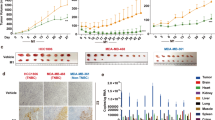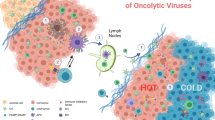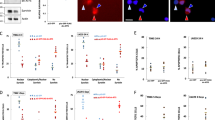Abstract
Suicide gene vectors are being developed in many laboratories as an attractive approach to cancer therapy. However, the development of these therapies is hampered by safety concerns and limitations of efficacy. The use of tumor-specific promoters, such as survivin promoter, can provide much needed specificity to target tumor cells. However, the expression levels from these promoters is often suboptimal and hence it is imperative to enhance the activity of the cytotoxic gene of interest. We tested apoptotic activity of several mutants of proapoptotic gene bax that constitutively translocate to the mitochondria and induce apoptosis. One of these mutants with deletion of serine at position S184 (S184del) was found to be most active and showed significant antitumor activity when expressed by the survivin promoter. In vitro testing shows that this vector (Sur-BaxS184del) induces cell killing in a variety of tumor cell lines of different origin with significantly higher efficacy than wild-type bax (Sur-BaxWT). The increase in cytotoxicity was a result of enhanced induction of apoptosis in tumor cells. In contrast to cytomegalovirus (CMV) promoter-driven bax (CMV-Bax), Sur-BaxS184del caused minimum toxicity in normal human dermal fibroblasts validating its specificity and safety. In a mouse tumor model (DA-3, murine breast cancer cells), we show that intratumoral injection of Sur-BaxS184del resulted in tumor growth retardation to the same level as CMV-Bax. This study highlights the effectiveness of using bax mutants in combination with survivin promoter for tumor-targeted suicide gene therapy in a nonviral vector.
This is a preview of subscription content, access via your institution
Access options
Subscribe to this journal
Receive 12 print issues and online access
$259.00 per year
only $21.58 per issue
Buy this article
- Purchase on Springer Link
- Instant access to full article PDF
Prices may be subject to local taxes which are calculated during checkout









Similar content being viewed by others
References
Lo HW, Day CP, Hung MC . Cancer-specific gene therapy. Adv Genet 2005; 54: 235–255.
Gu J, Andreeff M, Roth JA, Fang B . hTERT promoter induces tumor-specific Bax gene expression and cell killing in syngenic mouse tumor model and prevents systemic toxicity. Gene Therapy 2002; 9: 30–37.
Lanteri M, Ollier L, Giordanengo V, Lefebvre JC . Designing a HER2/neu promoter to drive alpha1,3galactosyltransferase expression for targeted anti-alphaGal antibody-mediated tumor cell killing. Breast Cancer Res 2005; 7: R487–R494.
Zhu ZB, Makhija SK, Lu B, Wang M, Kaliberova L, Liu B et al. Transcriptional targeting of tumors with a novel tumor-specific survivin promoter. Cancer Gene Ther 2004; 11: 256–262.
Altieri DC . Survivin in apoptosis control and cell cycle regulation in cancer. Prog Cell Cycle Res 2003; 5: 447–452.
Altieri DC . Survivin, versatile modulation of cell division and apoptosis in cancer. Oncogene 2003; 22: 8581–8589.
Bao R, Connolly DC, Murphy M, Green J, Weinstein JK, Pisarcik DA et al. Activation of cancer-specific gene expression by the survivin promoter. J Natl Cancer Inst 2002; 94: 522–528.
Caldas H, Jaynes FO, Boyer MW, Hammond S, Altura RA . Survivin and Granzyme B-induced apoptosis, a novel anticancer therapy. Mol Cancer Ther 2006; 5: 693–703.
Van Houdt WJ, Haviv YS, Lu B, Wang M, Rivera AA, Ulasov IV et al. The human survivin promoter: a novel transcriptional targeting strategy for treatment of glioma. J Neurosurg 2006; 104: 583–592.
Zhu ZB, Chen Y, Makhija SK, Lu B, Wang M, Rivera AA et al. Survivin promoter-based conditionally replicative adenoviruses target cholangiocarcinoma. Int J Oncol 2006; 29: 1319–1329.
Zhu ZB, Makhija SK, Lu B, Wang M, Wang S, Takayama K et al. Targeting mesothelioma using an infectivity enhanced survivin-conditionally replicative adenoviruses. J Thorac Oncol 2006; 1: 701–711.
Wolter KG, Hsu YT, Smith CL, Nechushtan A, Xi XG, Youle RJ . Movement of Bax from the cytosol to mitochondria during apoptosis. J Cell Biol 1997; 139: 1281–1292.
Madesh M, Antonsson B, Srinivasula SM, Alnemri ES, Hajnoczky G . Rapid kinetics of tBid-induced cytochrome c and Smac/DIABLO release and mitochondrial depolarization. J Biol Chem 2002; 277: 5651–5659.
Li YM, Wen Y, Zhou BP, Kuo HP, Ding Q, Hung MC . Enhancement of Bik antitumor effect by Bik mutants. Cancer Res 2003; 63: 7630–7633.
Coll JL, Negoescu A, Louis N, Sachs L, Tenaud C, Girardot V et al. Antitumor activity of bax and p53 naked gene transfer in lung cancer: in vitro and in vivo analysis. Hum Gene Ther 1998; 9: 2063–2074.
Haghighat P, Timiryasova TM, Chen B, Kajioka EH, Gridley DS, Fodor I . Antitumor effect of IL-2, p53, and bax gene transfer in C6 glioma cells. Anticancer Res 2000; 20: 1337–1342.
Norris JS, Hyer ML, Voelkel-Johnson C, Lowe SL, Rubinchik S, Dong JY . The use of Fas Ligand, TRAIL and Bax in gene therapy of prostate cancer. Curr Gene Ther 2001; 1: 123–136.
Huh WK, Gomez-Navarro J, Arafat WO, Xiang J, Mahasreshti PJ, Alvarez RD et al. Bax-induced apoptosis as a novel gene therapy approach for carcinoma of the cervix. Gynecol Oncol 2001; 83: 370–377.
Li X, Marani M, Yu J, Nan B, Roth JA, Kagawa S et al. Adenovirus-mediated Bax overexpression for the induction of therapeutic apoptosis in prostate cancer. Cancer Res 2001; 61: 186–191.
Gu J, Kagawa S, Takakura M, Kyo S, Inoue M, Roth JA et al. Tumor-specific transgene expression from the human telomerase reverse transcriptase promoter enables targeting of the therapeutic effects of the Bax gene to cancers. Cancer Res 2000; 60: 5359–5364.
Okumura K, Nakase M, Nakamura S, Kamei T, Inui M, Tagawa T . Bax gene therapy for human osteosarcoma using cationic liposomes in vivo. Oncol Rep 2007; 17: 769–773.
Okumura K, Nakase M, Nakamura S, Inui M, Hiramoto K, Tagawa T . Antitumor activity of cationic liposome-mediated Bax gene transfer in osteosarcoma cells: induction of apoptosis and caspase-independent cell death. Int J Oncol 2005; 27: 433–438.
Kazhdan I, Long L, Montellano R, Cavazos DA, Marciniak RA . Targeted gene therapy for breast cancer with truncated Bid. Cancer Gene Ther 2006; 13: 141–149.
Precht TA, Phelps RA, Linseman DA, Butts BD, Le SS, Laessig TA et al. The permeability transition pore triggers Bax translocation to mitochondria during neuronal apoptosis. Cell Death Differ 2005; 12: 255–265.
Smaili SS, Hsu YT, Sanders KM, Russell JT, Youle RJ . Bax translocation to mitochondria subsequent to a rapid loss of mitochondrial membrane potential. Cell Death Differ 2001; 8: 909–920.
Nechushtan A, Smith CL, Hsu YT, Youle RJ . Conformation of the Bax C-terminus regulates subcellular location and cell death. EMBO J 1999; 18: 2330–2341.
Xin M, Gao F, May WS, Flagg T, Deng X . Protein kinase Czeta abrogates the proapoptotic function of Bax through phosphorylation. J Biol Chem 2007; 282: 21268–21277.
Xin M, Deng X . Protein phosphatase 2A enhances the proapoptotic function of Bax through dephosphorylation. J Biol Chem 2006; 281: 18859–18867.
Owen JL, Iragavarapu-Charyulu V, Gunja-Smith Z, Herbert LM, Grosso JF, Lopez DM . Up-regulation of matrix metalloproteinase-9 in T lymphocytes of mammary tumor bearers: role of vascular endothelial growth factor. J Immunol 2003; 171: 4340–4351.
Grosso JF, Herbert LM, Owen JL, Lopez DM . MUC1/sec-expressing tumors are rejected in vivo by a T cell-dependent mechanism and secrete high levels of CCL2. J Immunol 2004; 173: 1721–1730.
Yu L, Kamo S, Tagawa M . Identification of a minimal c-erbB-2 promoter region that mediates preferential expression of a linked foreign gene in human breast cancer cells. Int J Oncol 2002; 20: 607–610.
Chen JS, Liu JC, Shen L, Rau KM, Kuo HP, Li YM et al. Cancer-specific activation of the survivin promoter and its potential use in gene therapy. Cancer Gene Ther 2004; 11: 740–747.
Tai YT, Strobel T, Kufe D, Cannistra SA . In vivo cytotoxicity of ovarian cancer cells through tumor-selective expression of the BAX gene. Cancer Res 1999; 59: 2121–2126.
Arafat WO, Gomez-Navarro J, Xiang J, Barnes MN, Mahasreshti P, Alvarez RD et al. An adenovirus encoding proapoptotic Bax induces apoptosis and enhances the radiation effect in human ovarian cancer. Mol Ther 2000; 1: 545–554.
Groeger AM, Esposito V, Cassandro R, Baldi G, Rossiello L, De Luca L et al. A model of BAX gene delivery to human lung cancer. Anticancer Res 2001; 21: 3627–3630.
Acknowledgements
We thank Rei Ming Dai, Loretta Scheetz and Donna Butcher for technical help. This research was supported (in part) by the Intramural Research Program of the NIH, National Cancer Institute, Center for Cancer Research.
Author information
Authors and Affiliations
Corresponding author
Rights and permissions
About this article
Cite this article
Garg, H., Salcedo, R., Trinchieri, G. et al. Improved nonviral cancer suicide gene therapy using survivin promoter-driven mutant Bax. Cancer Gene Ther 17, 155–163 (2010). https://doi.org/10.1038/cgt.2009.63
Received:
Revised:
Accepted:
Published:
Issue Date:
DOI: https://doi.org/10.1038/cgt.2009.63
Keywords
This article is cited by
-
MiR-499 Responsive Lethal Construct for Removal of Human Embryonic Stem Cells after Cardiac Differentiation
Scientific Reports (2019)
-
Targeted killing effects of double CD and TK suicide genes controlled by survivin promoter on gastric cancer cell
Molecular Biology Reports (2011)



